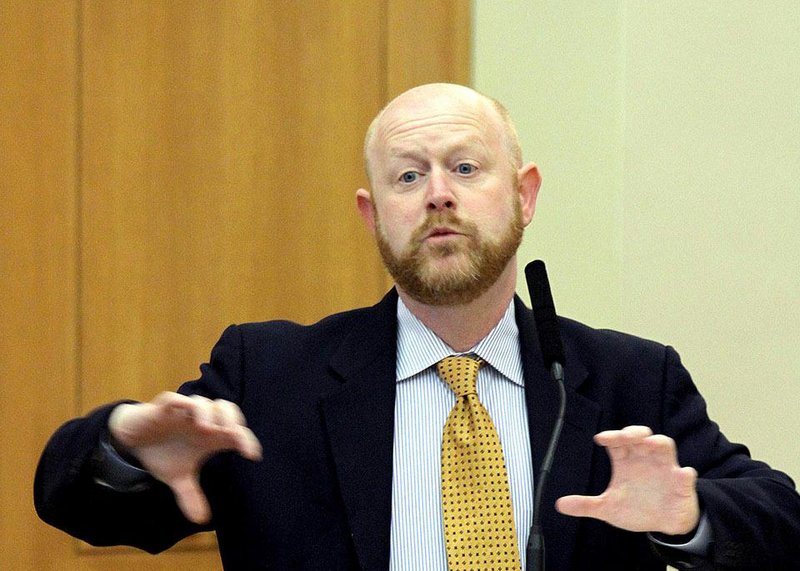In the wake of the decision to dismantle the Little Rock School Board and take over Arkansas' largest public school system, the state plans to study what the appropriate school district lines should be within Pulaski County.
The study will come at a time when the state is in control of not only the Little Rock School District but also the Pulaski County Special School District. Also, Jacksonville civic leaders are preparing to start their own school district no later than 2016-17, breaking away from the Pulaski County Special district.
And civic leaders in Maumelle and Sherwood want to form their own school districts, breaking from the Pulaski County Special district, but a settlement in the Pulaski County school desegregation case is blocking that effort for now.
Jay Barth, an Arkansas Board of Education member from Little Rock, came up with the idea for the study and will head the committee.
"Right now, of course, there are four districts," he said, referring to the Little Rock, North Little Rock, Pulaski County Special and Jacksonville/North Pulaski school districts.
"How many should there be?" he said in an interview last week. "And then, where do those lines most naturally fall for financing schools and having schools reflective of our county? What does make the most sense? Where are people living? What is the tax base [in those areas]? Is there a more efficient way to deliver public education in the county?"
So far, state Education Board member Diane Zook of Melbourne has signed up to participate on the committee. The committee's findings will be presented to the Education Board by June.
Barth proposed the study Wednesday after the Education Board's 5-4 decision to remove the Little Rock School Board and put the superintendent under the authority of the state's education commissioner.
Barth -- who voted against the takeover -- said the Education Board has never reviewed school district lines as far as he knew.
"Except related to the Jacksonville case," Barth said. "There was a lot of momentum for Jacksonville, and I thought [Wednesday] was an opportunity to get that on the table. It's an opportunity to figure out if the district lines do make sense."
The schools landscape in Pulaski County is changing.
In September, voters overwhelmingly approved carving a new Jacksonville/North Pulaski public school district out of the Pulaski County Special School District. Jacksonville civic leaders had talked about doing that as far back as the 1960s.
The Pulaski County Special School District was formed by combining several small school districts in the 1920s, Barth said.
"The county has changed dramatically since then," he added, referring to demographics and tax bases. "A portion of the city of Little Rock is in the Pulaski County Special School District lines. Maumelle didn't even exist as a city in the 1970s. Yet, we're still operating in these same district lines."
Barth said he didn't have "a clear motive" in asking for the study, something he's asked for several times in the past.
Sam Ledbetter, who is the state Education Board chairman, anticipates getting a lot of input from people.
"That would be something [on which] you would want to have as much public comment as you could," Ledbetter added.
Arkansas Education Commissioner Tony Wood said Friday that there are provisions in state law that permit the changing of boundary lines between school districts. That can be done voluntarily, by the affected school districts requesting it from state Board of Education, Wood said. Also, the state Education Board has the authority in some circumstances to direct the involuntary change of boundary lines for districts.
The Education Board, for example, last year divided the Stephens School District among three other districts -- Magnolia, Camden-Fairview and Nevada County -- when the Stephens district fell below the 350-minimum student requirement for operating a district.
Wood declined to speculate about how state boundary laws would pertain in Pulaski County, where two districts are now operating under state control and the Jacksonville/North Pulaski School District has been established but is not yet separated from the Pulaski County Special School District.
"There is such an unusual set of facts here," said Wood, who as education commissioner is the School Board for any state-run district.
For decades, Pulaski County has had three public school districts: Little Rock, North Little Rock and Pulaski County Special. In 1982, the Little Rock School District sued the state, seeking a tri-district consolidation as a remedy for desegregation issues. A federal judge agreed, but the 8th U.S. Circuit Court of Appeals overturned the decision.
The districts remained separate. But some boundaries changed: southwest Little Rock moved from the Pulaski County Special to the Little Rock district. Most of Chenal Valley, although part of the city of Little Rock, remained in the Pulaski County special district. And the appeals court decided that the city school district boundaries would not automatically grow with the city of Little Rock's westward expansion.
If the Education Board decides to tinker with school district lines within the county, it would need approval from U.S. District Judge D. Price Marshall Jr. because the Pulaski County Special district is under federal court supervision in the 34-year-old desegregation case.
A January 2014 settlement in the Pulaski County school desegregation lawsuit obligates the state to "oppose the creation of any other school districts from PCSSD's territory until PCSSD is declared fully unitary and is released from federal court supervision."
State Sen. Joyce Elliott, D-Little Rock, who spoke out against the takeover at last week's Education Board meeting, has some concerns about changing boundaries in districts that don't have locally elected school boards.
"The autonomy of the state board without the representation of the elected school board -- to accomplish it that way -- to me, would be a gross abuse of power," she said.
A section on 02/01/2015

